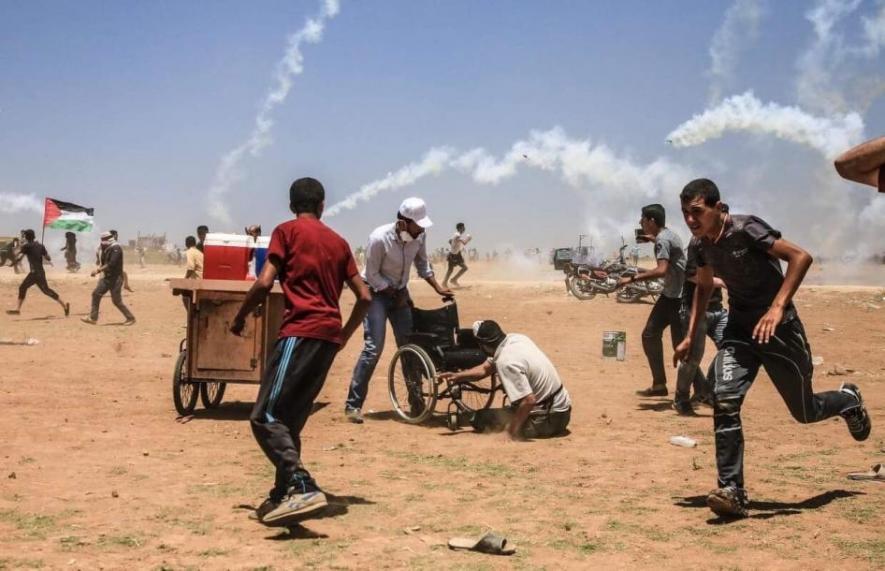India’s People Stand With Palestine

Image Coutesy: Human Rights Watch
The Ministry of Health at Gaza has been gathering the numbers – hundreds killed by the Israeli armies, thousands injured by armed fire and tear gas. Israel not only killed those who openly demonstrated at the perimeter fence, but its troops also fired at and killed health workers and journalists. It did not matter, for instance, that the paramedic Razan al-Najjar (age 21) wore the signs of a medical worker, nor that Mohammed al-Baba, a photographer for Agence France-Presse, was clearly wearing a sign that read PRESS. Both were shot, the former killed, and the latter injured.
Why did the people of Gaza march to the perimeter fence? They wanted to put on record two points: (1) their existence as Palestinians who have the right to return to their lands and (2) their right as Palestinians to protest against the appalling conditions of life as a result of the Israeli siege of Gaza.
Israel denies the Palestinians the right to exist and, therefore, to their lands and lives. This is why the UN General Assembly voted to censure Israel – not only for the murder of these hundreds of Palestinians, but also for the ongoing occupation that produced the conditions for this murder.
India was part of the 120-member states of the UN that voted to censure Israel. This is an important vote for India. It signals that India remains outside the complete US demand that it votes – as the US does – for Israel’s occupation of the Palestinians. Despite the sentiment in the current Indian government, the general consensus on behalf of the Palestinians is not completely eroded.
Meanwhile, below the government, two mass movements of the Indian Left – the All-India Kisan Sabha and the Students Federation of India – have given their support to the Palestinian cause.
The 16 million-member Kisan Sabha, at its recent congress in last October, voted to endorse the Boycott-Divestment-Sanctions (BDS) movement. This BDS movement is a powerful, international effort to force Israel to make serious concessions to the Palestinians. It is a peaceful weapon that is being wielded to push the Israelis to the negotiation table. As a result of the full backing by the United States, Israel has not been at all serious about negotiations. Instead, it has furthered its occupation of Palestinian lives in the West Bank and East Jerusalem, tightened its siege on Gaza, attempted to seize all of Jerusalem as Israel’s capital and disregarded the Palestinians refugees who have lived outside their country since 1948. The point of the BDS movement is to give the Palestinians some external political power so that they can push a political agenda against the Israeli occupation.
This week, the four million students of the SFI endorsed a boycott call against Hewlett-Packard (HP). The computer firm has close ties with the Israeli government, notably its military section which is actively involved in the suppression of Palestinian rights. Many Indian students, who can afford a computer at all, have been drawn to HP’s laptops. Now, there is not only the monetary price for the laptop but a political one as well. It is likely that HP would lose $120 million potential sales – and more. The students will now campaign against HP across India. It will help raise awareness about the terrible conditions placed on the Palestinians by Israel.
Last week, two thousand people took to the streets in Ramallah (Palestine) to offer their solidarity with Gaza and to demand a firmer political agenda for Palestinian politics. Jamal Juma of Stop the Wall said, ‘I felt that the entire Palestinian people have been waiting for this moment, whether in Gaza, inside the Green Line or outside’. The Green Line is the perimeter that divides the occupied territory from Israel. Juma said that the Palestinian people had been waiting for their anger to be transformed into action. These protests are a first sign of that action.
Solidarity is a curious practice. Currently, solidarity with Palestinians has been offered towards the whole Palestinian people, to the Palestinian people as an abstraction. There is no concrete solidarity with any particular Palestinian mass organisation. The political parties have been eviscerated by the Israeli occupation and by the Oslo surrender by sections of the Palestinian nationalist movement. People who took to the streets in the West Bank and by the perimeter fence in Gaza are fighting to build a new mass movement inside the world of Palestine. They are the ones with whom we are now concretely in solidarity – not because they require our support as victims, but because they need our support as fighters for their future.
Get the latest reports & analysis with people's perspective on Protests, movements & deep analytical videos, discussions of the current affairs in your Telegram app. Subscribe to NewsClick's Telegram channel & get Real-Time updates on stories, as they get published on our website.























